School Daze - Education Problems & Solutions
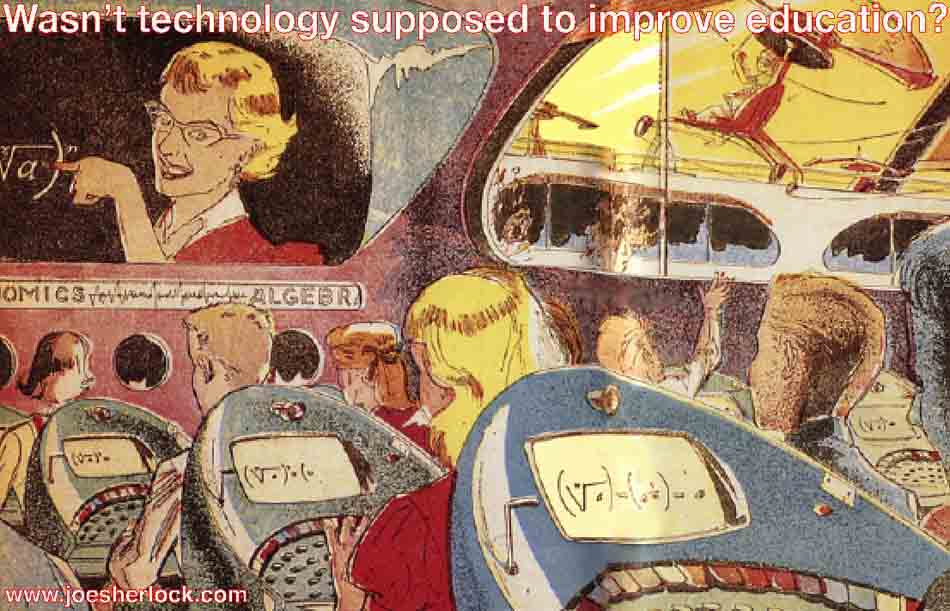
Interesting Facts: In 2019, home-schooled students represented just 3.2% of US students in grades K through 12. By fall 2020, the figure had doubled to 11.1%.

Corey DeAngelis wrote, "Public schools lost nearly 1.3 million students this year." Pre-K and kindergarten jointly saw a sharp 13% drop. The stark numbers represent the biggest year-over-year decline in enrollment since the start of the century, with the drop concentrated among the youngest learners. Pre-K saw a 22%, kindergarten enrollment fell by 9% and grades 1–8 experienced a 3% drop.
In addition, the number of home school applications submitted to the California Department of Education doubled during the 2020-2021 school year. The largest increase in homeschoolers was especially notable among minority groups, including black and Hispanic learners. "In African American households, the proportion of homeschooling quintupled from 3.3% in spring 2020, to 16.1% in fall 2020. … In Hispanic households, the number of homeschooling households doubled in the same time, from 6.2% to 12.1%."
Why? Pick your poison - teachers who don't want to work, Critical Race Theory, the 1619 project, bizarre sex ed, overemphasis on queer stuff, equity, abandonment of Judeo-Christian values, teaching kids to be ashamed of America's heritage, marginalizing white people ... the list continues. (posted 7/6/21, permalink)
School Misspending: The latest screamfest from the various teacher's groups is that they're "grossly underpaid." Karl Denninger noted that teachers only work 9 months out of the year- about 72% of a standard work-year. "And before you talk about "overtime" do realize that professionals don't get paid overtime."
Considering the slipping student proficiency scores, teachers are "grossly overpaid," according to Karl. As are school administrators who seem to have zero accountability - for anything.
Money is so often wasted by government. Businesses waste money too, but soon learn from their mistakes, either because the money drain makes them look closer at the problem, drives them bankrupt or activist stockholders point it out and, if its not fixed, replace the management dolts with new, smarter executives. In government, these fixes don't happen because the bureaucracy is too large and there's far less oversight. Consider public education, when measuring expenditures versus results:
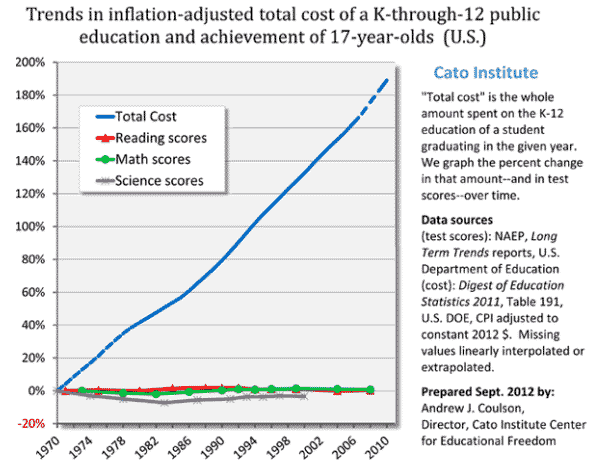
In 40 years, the ratio of school employees to students has significantly increased, mostly because of bloated administrative bureaucracies. Productivity - as measured by output per employee - has, therefore, substantially declined. And student performance - as measured by test scores have not improved at all.
Last year, Battle Ground (WA) submitted a school bond levy to voters. It was rejected. With an absurd combination of tone-deafness and hubris only encountered in the public sector, the school district waited a bit, then resubmitted the exact same levy last month. It was again rejected. Voters aren't dumb. They realized that the levy was not about helping the children. It was about greedy union employees and administrations lining their pockets.
Kelly Hinton wrote of school spending, "There has never been any direct correlation between money and outcomes." Washington State's leaders promised more spending on schools would improve student learning results. "Since 2009 the state of Washington has increased spending on the schools by $9.7 billion, a 75% increase. 2017 NAEP scores show test scores have barely budged. The achievement gap between minority and white students remains as large as ever. Other states are finding that student learning improves when parents are given access to public charter schools, Education Savings Accounts, vouchers, online learning, and other forms of school choice. More money has not improved public schools. Further, state data show that in 2017 administrators sent 160,000 Washington state children to 253 failing public schools."
It's time to stop wasting our tax dollars. (posted 5/18/18, permalink)
The Fundamental State Of Higher Education Today: David P. Goldman complained that few universities offer serious studies of great literature as part of their curriculum.
He noted that "Wellesley College, Hillary Clinton's alma mater, has canceled its annual performance of 'The Vagina Monologues' - itself a vulgar slap at the supposed male bias of Western civilization - because it is upsetting to transgendered women who do not have vaginas.
Perhaps the politically-correct women of Wellesley could rewrite the play as 'The Anus Monologues'. That lowest common denominator would include everyone." Yup.
In somewhat related news, Britain's University of Cambridge is morphing into a kindergarten. The university has hired a Professor of Lego who will "be the head of their own research department."
"Officials say the role is expected to be created within the Faculty of Education after the university received £4 million of donations from the Lego Foundation. Cambridge's general board has recommended for the Lego professorship 'of play in education, development and learning' to start in October 2015." (posted 6/25/15, permalink)
Throwing Money At A Problem Doesn't Necessarily Solve It: Money is often wasted, especially by government.
Businesses waste money too, but soon learn from their mistakes, either because the money drain makes them look closer at the problem, or drives them bankrupt or activist stockholders point it out and, if its not fixed, replace the management dolts with new, smarter executives. Sadly, in government these fixes don't happen because the bureaucracy is too large and there's far less oversight.
John Hinderaker of Powerline has provided just one example: public education spending.
Hinderaker wrote, "And if the money we have spent so far hasn't done the trick, the solution is to spend even more. The possibility that there is little or no correlation between federal spending and progress is one they can't comprehend."

This graphic illustration from the Cato Institute, illustrates the point. It plots per-pupil K-12 spending in constant 2012 dollars against student achievement in reading, math and science.
Hinderaker concluded, "I'm going to go out on a limb here: I don't think that demands for ever more spending on public education have anything to do with benefiting students."
I've written about education problems before. In the past 40 years, we have made great strides in productivity. Walk through any auto assembly plant and you'll find that it takes less than half the number of people to assemble cars as it did forty years ago. Not because of outsourcing (a lot of components were outsourced in the 1960s as well) but because of robots, assembly-smart design and technology. Technology has paid off in quality, too. The cars of 2014 are far better built than those of 1970.
Visit any accounting office and you'll find far fewer people than in the 1970s. Why? Technology - computers and software have replaced pencils, comptometers and adding machines. Your tax returns and financial statements are far less likely to have errors than forty years ago thanks to automated accounting.
Go to any supermarket and you'll find fewer employees per square foot than there used to be. Scanners, automated inventory control and other new technology have made all the difference. Stores are cleaner and better organized than they used to be.
In 40 years, technology has improved efficiency/productivity, reduced costs and produced improved quality/results in all of the above examples.
Then there's education. In 40 years, there has been a significant increase in the ratio of school employees to students, mostly because of bloated administrative bureaucracies. Productivity - as measured by output per employee - has, therefore, substantially declined. And student performance - as measured by test scores have not improved.
It's high time to junk our antiquated public education system, get rid of the teachers unions and start over, applying the same technological improvements which have greatly boosted productivity and quality levels elsewhere. The late Steve Jobs advocated such changes. That's the true path to high-quality public education in the 21st Century. (posted 1/23/15, permalink)
Despicable Students: Dave Miceli wrote, "I have taught in the Baltimore public school system for the past two decades. What we need is better students. They have trashed brand new computers, destroyed exit signs, set multiple fires, destroyed many, many lockers, stolen teachers' school supplies, written their filth on the tops of classroom desks, defecated in the bathrooms and stairwells, assaulted teachers (beyond constantly telling them to perform certain impossible acts upon themselves) and refused to do any homework or class work."
Columnist Gregory Kane called Miceli "courageous for saying what he said in a city that's majority black, with a school system that's majority black, and where most of the elected officials are black Democrats." Kane, who is black, noted that "among liberals and Democrats, there is this notion that the poor - especially the black poor - can do no wrong. If you criticize any poor and black person who displays inappropriate, boorish or egregiously bad conduct, you'll be dismissed as a racist if you're not black."
You can't teach students who don't want to learn, regardless of their ethnicity. They should be expelled so those who do want to learn aren't disrupted. This not a racial issue; it is a cultural issue, which happens to be ingrained in many impoverished, black, single-parent families. Education is wasted on people with little interest in learning.
Tony Danza's remarkable book documents the problems of trying to teach poor students with uninvolved and indifferent parents. Danza has dramatically portrayed the frustration that urban educators experience in an impossible system where they are expected to be teachers, disciplinarians and substitute parents.
The core of the problem is the destruction of the black family. Our federal government started it all, offering a welfare system that encouraged women to have more kids to get more money and to not to have a father because the dole might be reduced. In 1950, 85% of black children were born to their two married parents. Today, 70% of black children are born to single mothers. "In some neighborhoods, two-parent families have vanished. In parts of Newark and Philadelphia, for example, it is common to find children who are not only growing up without their fathers but don't know anyone who is living with his or her biological father."
Once the template was set by our dumb, bleeding-heart politicians, it became self perpetuating and the cycle not only remains unbroken, it has snowballed as welfare moms beget large broods who grow up aspiring to be welfare moms. Or absent dads. (posted 8/22/13, permalink)
Ripping Off Taxpayers: Jami Lund, a Senior Education Policy Analyst for the Freedom Foundation, a free-market think tank in Olympia, WA, has written about the upcoming Battle Ground, WA school levy. This property tax levy was resoundingly defeated in February but the BG administrators decided that the public was stupid and resubmitted the exact same levy for another vote.
In a letter to The Reflector, Mr. Lund pointed out, "The state provides an average salary of $51,909 and benefits worth $9,216 for teachers in the Battle Ground School District. The school board has decided to add an 8.3% levy-funded bonus to the wage. For these funds, the community receives three days of additional specified responsibilities when students are not present.
Levy-funded wage enhancements also happen for administrative and classified employees, but it is more defensible since the state is not providing an actual salary. The state sends the district a rough allocation of $58,439 per administrator and $31,260 per full-time classified employee. Levies fund the difference between these allocations and actual administrator wages, which average $96,862 in Battle Ground. Enhancements from levies to make these state allocations into the actual wage for administrators and classified employees cost at least $2 million.
In addition to bonuses, the school board provides one day’s pay for employees who work 180 days without taking personal leave. The state allocation assumes sick leave but no personal leave.
Any attendance incentives are levy-funded. If all employees in the bargaining unit took this incentive, the district would pay more than $200,000. Another levy-funded bonus is available only to the highest-paid certificated employees. Those who have been employed in schools for 21 or more years are able to claim between $175 and $700 or extra personal leave days. More than 150 employees are eligible for this bonus.
Finally, teachers are able to receive wage bonuses for large class sizes. The school board has decided that for each student above the target class size, the teacher may receive $1,200 in wages at the teacher’s discretion. If the priority was smaller class sizes, the policy would be something other than creating a financial incentive for larger classes."
 There have been many letters to the editor in recent issues of The Reflector, promoting passage of this levy. Many have been written by educators or school-system employees. The tone of these missives always carries the Helen Lovejoy-like cry of "What about the children?!" There have been many letters to the editor in recent issues of The Reflector, promoting passage of this levy. Many have been written by educators or school-system employees. The tone of these missives always carries the Helen Lovejoy-like cry of "What about the children?!"
I love kids but hate it when people falsely play the "children" card.
Lund pointed out, "When the legislature reduced the wages by 1.9% for the adult employees, the school board decided to shield the adults and instead impact students and families by withholding services on half of 10 school days - essentially a 3% service decline in return for a 1.9% wage reduction.
In other words, the school board has decided the priority is to translate adult wage decreases into even larger service reductions for the community.
From my seat in Olympia, I cannot say whether these factors are responsible for the public reluctance to support the levy in Battle Ground. Citizens who favor local control of schools should welcome sensible levies as the only money which is free of state and federal strings."
This levy is not about helping the children. It's about greedy union employees and administrations lining their pockets. (posted 4/9/13, permalink)
'I'd Like to Apologize to Every Teacher I Ever Had: My Year as a Rookie Teacher at Northeast High' by Tony Danza
I know little of actor Tony Danza and his work, except for watching the sitcom 'Taxi' in the late 1970s. I selected this book, not because of Danza, but because of the captivating title.
Northeast High School is located near Cottman & Castor Avenues in the Rawnhurst Section of Northeast Philadelphia. Cottman, the nationwide chain of transmission repair shops, was named after this very same avenue where the first Cottman Transmission was located - not far from the school.

The neighborhood used to be solidly middle-class, white and heavily Jewish with a sprinkling of Baptists, Presbyterians, Lutherans and Catholics. When I was growing up, my uncle's family home was two blocks from this school. Some of my wife's friends graduated from NE. The five places where I lived during my years in Philadelphia were all within a few miles of Northeast High School.
These days ... (more >>>)
Charter School Debate: In each issue, 'The Costco Connection' magazine offers a debate question with experts weighing in on each side. The a recent issue asked, "Are charter schools a good idea?" Answering in the negative was Julie Cavanagh, a Brooklyn teacher. The second sentence of her argument stopped me dead: "Unfortunately, the charter school landscape has evolved into a politically-charged campaign that aims to impose the same business-minded approaches that took our country to the brink of economic disaster in recent years."
Whoa. Many of the factors that caused the recent financial crisis were caused not by business but by government. Beginning with the 1977 Community Reinvestment Act, there was increasing government interference in the free market banking process. Over the years, the government assumed more and more of the home lending function. Even in the mid-1980s, most mortgages were private and were not sold or repackaged. By 2006, 90% of all mortgages were done through quasi-government entities Fannie Mae and Freddie Mac.
In June 2010, Sheila Bair, chair of the Federal Deposit Insurance Corporation, remarked, "The financial crisis was triggered by a reckless departure from tried and true, common-sense loan underwriting practices." If the mortgage finance industry hadn't been forced to abandon traditional underwriting standards on behalf of a government-imposed affordable housing policy, the mortgage meltdown and resulting financial crisis would not have occurred.
Given Ms. Cavanagh's bizarre and incorrect worldview that business-minded approaches are the root of all evil, it became difficult for me to give credence to anything else she wrote.
As for the charter school movement, that originated in the late 1980s as a response to the decline of American public schools and the appalling quality of education. The idea was that charter schools were to be accountable for and judged by student achievement. Twenty-plus years later, the record on the charter school experiment is mixed. Some have done spectacularly well while others have failed and closed their doors. Charter school programs and restrictions vary by state, which accounts for some of the variation in outcomes.
My business-minded approach would be to find the points of commonality among all the successful charter schools and then do the same for the failed ones. Use these data to "design out" the flaws based on the failures and optimize the best practices which the victors have in common. Use the resultant model as a foundation for future charter schools.
In the Costco piece, Cavanagh wrote, "Access to a high-quality public education is a basic human and civil right." Double whoa. While all of us would agree that a good education is a desirable thing, raising it to the level of a "basic human and civil right" is hyperbole at best and, at worst, sounds like a lefty teachers union talking point. A little research revealed that Julie Cavanagh is a big-time booster of teachers unions.
A few years ago, Apple Inc. CEO Steve Jobs lambasted teachers unions, asking "What kind of person could you get to run a small business if you told them that when they came in they couldn't get rid of people that they thought weren't any good?"
I've written before about the embarrassment of today's public education - a system of which Ms. Cavanagh is a part.
It's high time to junk our antiquated public education system, get rid of the teachers unions and start over, applying the same technological improvements which have greatly boosted productivity and quality levels elsewhere. That's what Steve Jobs was talking about. That's the true path to high-quality public education in the 21st Century. (posted 8/9/12, permalink)
The Next Bubble: According to federal officials, the amount Americans owe on student loans is far higher than earlier estimates and could lead some consumers to postpone buying homes, potentially slowing the housing recovery.
"Total student debt outstanding appears to have surpassed $1 trillion late last year, said officials at the Consumer Financial Protection Bureau, a federal agency created in the wake of the financial crisis. That would be roughly 16% higher than an estimate earlier this year by the Federal Reserve Bank of New York."
"New York Fed data show that as many as one in four student borrowers who have begun repaying their education debts are behind on payments."
You can see where this is headed. Toward something which is unsustainable. Then ... pop. Look for massive student loan defaults, a crisis at Sallie Mae which will cause student loans to become far less available, the collapse of universities whose tuitions were too high and enrollment too low and the big rise of alternate low-cost, cheap-to-operate online education alternatives.
Today, educators prepare students to become "knowledge workers" - clerks and bureaucrats. Or diversity consultants. Or life coaches. Or community organizers. These are career paths which are fast becoming useless and obsolete.
 Too many of today's college courses are irrelevant to the real world and, therefore, worthless to prospective employers. The value of a diploma has depreciated substantially because of the greater number of stupider students (lower SAT scores, lower high school GPAs) now admitted - and permitted to graduate - in order to fill seats for the dumbed-down and irrelevant courses. Too many of today's college courses are irrelevant to the real world and, therefore, worthless to prospective employers. The value of a diploma has depreciated substantially because of the greater number of stupider students (lower SAT scores, lower high school GPAs) now admitted - and permitted to graduate - in order to fill seats for the dumbed-down and irrelevant courses.
For many, college is no longer worth the money, especially those with arts, education or social science degrees.
Financial guru Malcolm Berko recently wrote that, "if your kids go to college, don't let them take those soapy, wishy-washy liberal arts courses, because they may never find an employer willing and dumb enough to hire them at a living wage." He opined that "most American college degrees aren't worth a tuppence. Tell your kids to enlist in the armed services when they finish high school. This will put employable experience under their belts and allow them to save some money, and when their hitch is up, Uncle Sam will pay their college tuition."
I have offered the following unscientific observations:
• College was a good idea until everyone started matriculating. Universities have dumbed-down their educational programs ("Don't Flunk The Customer!") to the point where a sheepskin is meaningless. Too many college grads are morons. Employers know this and discount the value a degree to the point where the cost of a BA - even from a low-cost state institution - will often never pay off.
• People in skilled trades - electricians, plumbers, cabinetmakers, machinists, etc. - now make far better wages than many college grads.
• Most of the unhappy people I've met are college graduates. My theory is that they were fed high expectations at the university (You're special!) which have been largely unmet in the workplace. (No, you're not.)
Finally, I would again emphasize that most educational institutions are teaching skills for yesterday's job market rather than tomorrow's.
Jeff Colvin has written that "in the 1970s, America's level of education stopped rising. The high school graduation rate peaked at 77% in 1969 and has since dropped to about 69%; college rates, too, stopped rising. The economy kept demanding more workers with advanced skills, but we stopped producing more. At the same time, other countries relentlessly educated their people, so the U.S. workforce fell from No. 1 in the world to the middle of the pack. Result: The minority of workers with advancing skills became more valuable, while the broad middle got flat or even falling pay."
"Then things got worse. The infotech revolution is great for high-wage workers because it turbocharges them; an executive with three screens on her desk and an iPhone in her pocket is enormously more productive. Infotech doesn't much hurt low-wage workers, many of whom do place-based work (cooking in restaurants, pouring concrete) that can't be done elsewhere. But infotech makes middle-class jobs disappear; software takes over routine back-office tasks, and infotech coordinates supply chains, so manufacturing jobs can be done by lower-paid workers abroad.
It's clear what the problem is not. It's not that the middle class got clobbered in the recession - that is, the recession's end isn't rescuing the middle class. Nor is the problem that income inequality increased, because it didn't during the recession; top earners on average got clobbered even worse in the recession than the middle class did.
The problem is that the middle class isn't supplying the new skills that the world is demanding. We can fix that problem. We fixed it in the early 20th century and again in the 1960s after Sputnik by overhauling our education system. That is mainly a state and local job, not a federal one."
My advice: be flexible. Learn a currently marketable skill. And develop a back-up skill, possibly something involving hand-craftsmanship which can't be easily automated or outsourced.
Give your hands something to do. Someday, you may be able to make a living from it. And your creations may very well outlive you, providing joy and fascination for generations yet unborn. Something which will never happen with, say, data processing. Or diversity consulting. (posted 4/17/12, permalink)
Dead Ivy: When I was in college (and dinosaurs roamed the earth), four years of tuition - not including room and board - at a private college cost roughly the same as a new Corvette. Four years at a state institution was priced at the level of a new air-cooled Beetle.

Few people had student loans. Those who did were able to pay them off within a few years.
Today, four-year tuition at a state college may cost as much as a new Corvette. Private universities ... think Mercedes S-Class to Bentley Continental, depending on the school. No wonder people now graduate with a lifetime loan burden.
Furthermore, many of today's college courses are irrelevant to the real world and, therefore, worthless to prospective employers. And the value of a diploma has depreciated substantially because of the greater number of stupider students (lower SAT scores, lower high school GPAs) now admitted - and permitted to graduate - in order to fill seats for the dumbed-down and irrelevant courses. And that doesn't take into account the dullards who get in solely because of Affirmative Action programs.
In forty years, SAT scores have "softened" and college has become 'High School Version 2.0'. Too many even college grads can't spell, diagram a sentence or calculate credit card interest.

In the early 1960s, college students spent 40 hours per week on academic work; now they spend only 27 hours per week. In 1961, 67% of students said they studied more than 20 hours per week; now only one in five study that much. As Mister Rogers might have asked, "Can you say 'party school'?"
Today's college costs are outrageous. Especially so, considering the lousy quality of education one receives. And the increasing cost spiral is unsustainable. Student debt just surpassed the country's credit-card debt for the first time. It is projected to top $1 trillion this year.
Rich Lowry has written, "Amid all the uplifting clichés at their commencement ceremonies, graduating college students won't hear a line applicable to some of them - you got ripped off."
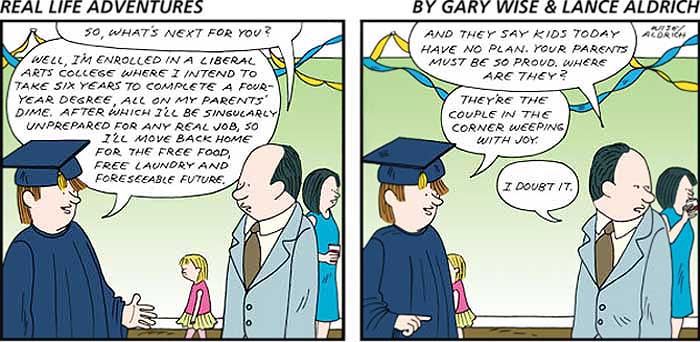
Sum up: For many, college is no longer worth the money, especially those with arts, education or social science degrees. (posted 5/30/11, permalink)
Another Reason Why Schools Are Failing: School playground supervision has now been outsourced to "recess coaches."
Playworks, a national non-profit that dispatches recess coaches to mostly inner-city schools, says its job is to "put the play back on playgrounds." It costs $60,000 per school. The organization currently is employed by four St. Paul, MN schools and plans to add eight more schools next year, including two in Minneapolis.
One elementary school principal said, "We needed to do something that would teach children how to play where they can solve problems together and have fun." Why does this moron still have a job? (posted 5/31/11, permalink)
The Embarrassment Of Public Education: John Hinderaker of Powerline has written, "It is no secret that education in America has lagged, by international standards, for quite a few years."
These graphs dramatically tell the story:
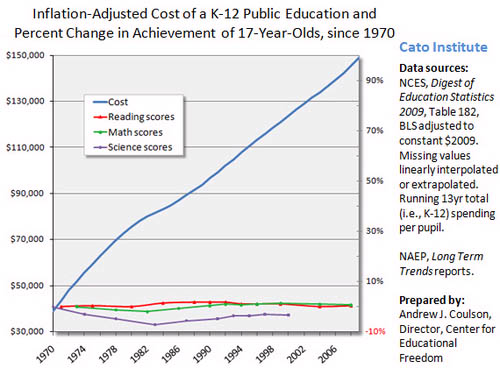
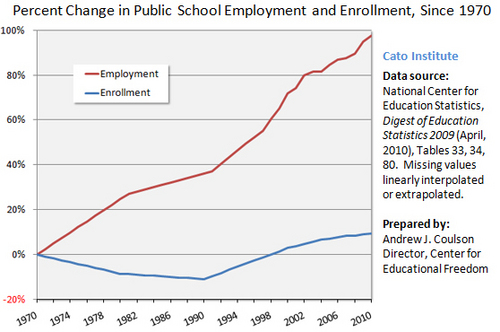
In the past 40 years, we have made great strides in productivity. Walk through any auto assembly plant and you'll find that it takes less than half the number of people to assemble cars as it did forty years ago. Not because of outsourcing (a lot of components were outsourced in the 1960s as well) but because of robots, assembly-smart design and technology. Technology has paid off in quality, too. The cars of 2008 are far better built than those of 1970.
Visit any accounting office and you'll find far fewer people than in the 1970s. Why? Technology - computers and software have replaced pencils, comptometers and adding machines. Your tax returns and financial statements are far less likely to have errors than forty years ago thanks to automated accounting.
Go to any supermarket and you'll find fewer employees per square foot than there used to be. Scanners, automated inventory control and other new technology have made all the difference. Stores are cleaner and better organized than they used to be.
In 40 years, technology has improved efficiency/productivity, reduced costs and produced improved quality/results in all of the above examples.
Then there's education. In 40 years, there has been a significant increase in the ratio of school employees to students, mostly because of bloated administrative bureaucracies. Productivity - as measured by output per employee - has, therefore, substantially declined.
Education costs have soared in every sector from first grade to university levels. Product quality, based on reading, math and science scores - and pretty much anything else you'd like to use as a measuring stick, has declined. In forty years, SAT scores have "softened" and high school has become 'Grade School Version 2.0'. Too many high-school grads (and even college grads) can't spell, diagram a sentence or calculate credit card interest.
What has the current president done to fix this problem? Just look at the Obama scoreboard:

In his book 'To Save America', Newt Gingrich has written, "Killing all attempts at meaningful reform, the union-dominated public education bureaucracy sacrifices our children's learning for its own financial interests."
It is time to junk our antiquated public education system, get rid of the teachers unions and start over, applying the same technological improvements which have greatly boosted productivity and quality levels elsewhere. (posted 10/6/10, permalink)
The Shocking Decline in education was apparent when I owned a manufacturing company many years ago. Here's a 1988 resignation notice from one of our marginal (on the soon-to-be-fired list) employees - a high school graduate - addressed to our plant superintendent:
Productivity Vs. Philosophy: In my 6/13/08 posting on education, I discussed the poor productivity of the U.S. educational system, defined as output (grades) divided by number of school employees per student. I suggested that we "junk our antiquated public education system and start over, applying the same technological improvements which have greatly boosted productivity and quality levels elsewhere."
Steve Sailer has pointed out that there's a need for a philosophical change, too. He writes: "In contrast to most of the rest of the industrialized world, we've demonized "tracking" students by ability and nearly abolished vocational education, insisting that everybody be on the college prep track."
"In contrast, our European and Asian economic rivals have largely resisted the urge to junk tracking. The rest of the world understands what America's educational leaders refuse to admit publicly: with teens with two digit IQs, failure is always an option. We insist that every student stick around until age 18 doing academic work that many despise. Hence, millions just stop coming to school. Over the last four decades, the high school dropout rate in America has increased from about 1/5th to 1/4th, according to Nobel laureate economist James Heckman."
"The amount of money that Japan, for instance, invests in training high school students for skilled blue-collar careers is astonishing by today's paltry American standards."
Steve notes: "In most of Germany, for example, children are still tracked, based on parents' and teachers' assessment of their academic potential, into different types of schools beginning with fifth grade. The lower kinds of schools lead to vocational training and rigorous apprenticeships. The high-quality blue-collar work force created by this system contributes mightily to the famed precision of the country's machine tools and BMWs." (posted 6/25/08, permalink)
Automobiles, Accounting, Supermarkets & Education: There is an interesting and thought-provoking article on the decline of the U.S. education system by Kevin Baker at The Smallest Minority. I recommend that you read it. (hat tip - Ragin' Dave)
In the past 40 years, we have made great strides in productivity. Walk through any auto assembly plant and you'll find that it takes less than half the number of people to assemble cars as it did forty years ago. Not because of outsourcing (a lot of components were outsourced in the 1960s as well) but because of robots, assembly-smart design and technology. Technology has paid off in quality, too. The cars of 2008 are far better built than those of 1968.
Visit any accounting office and you'll find far fewer people than in the 1960s. Why? Technology - computers and software have replaced pencils, comptometers and adding machines. Your tax returns and financial statements are far less likely to have errors than forty years ago thanks to automated accounting.
Go to any supermarket and you'll find fewer employees per square foot than there used to be. Scanners, automated inventory control and other new technology have made all the difference. Stores are cleaner and better organized than they used to be.
In 40 years, technology has improved efficiency/productivity, reduced costs and produced improved quality/results in all of the above examples.
Then there's education. In 40 years, there has been no improvement in the ratio of students to school employees. In fact, productivity is generally worse. Education costs are soaring in every sector from first grade to university levels. Product quality - based on reading, math scores and pretty much anything else you'd like to use as a measuring stick - is steadily declining. In forty years, grades in almost all public schools haven't improved, SAT scores have "softened", and high school has become 'Grade School Version 2.0'. Too many high-school grads (and even many college grads) can't spell, diagram a sentence or calculate credit card interest.
It is time to junk our antiquated public education system and start over, applying the same technological improvements which have greatly boosted productivity and quality levels elsewhere.
At present, schools are simply: Your Tax Dollars At Waste. (posted 6/13/08, permalink)
Workin' For Yourself: Writing in the Wall Street Journal, Michael Malone points out that, while we still have companies and corporations, "now they are virtualized, with online work teams handing off assignments to each other 24/7 around the world. Men and women go to work, but the office is increasingly likely to be in the den. In 2005, an Intel survey of its employees found that nearly 20% of its professionals had never met their boss face-to-face. Half of them never expected to. Last summer, when the Media X institute at Stanford extended that survey to IBM, Sun, HP, Microsoft and Cisco, the percentages turned out to be even greater."
Malone continues: "Half of all new college graduates now believe that self-employment is more secure than a full-time job. Today, 80% of the colleges and universities in the U.S. now offer courses on entrepreneurship; 60% of Gen Y business owners consider themselves to be serial entrepreneurs ... An upcoming wave of new workers in our society will never work for an established company if they can help it. To them, having a traditional job is one of the biggest career failures they can imagine."
The 21st Century will be titled by some: The Return of the Entrepreneur (posted 5/21/08, permalink)
In Search Of Tinkerers: John Derbyshire bemoans the general loss of interest in creating and fixing stuff. "The other evening Bill O'Reilly had a segment on the old Cheers! sitcom of the 1980s. He brought in John Ratzenberger (Cheers' Cliff Clavin and host of 'Made In America') as a guest. As well as being an actor, John is founder of the Nuts, Bolts, and Thingamajigs Foundation, dedicated to raising awareness of skilled trades and engineering disciplines among young people." John says, "Skilled trades form the backbone of America!"
Derbyshire continues: "To anyone under forty, a garage is a place to keep your car, and a basement is a rumpus room for the kids. Yet the U.S.A. sprang up out of garage and basement tinkerers, small workshops, teen boys fixing up their cars on a Saturday morning. Everything from the aeroplane to the personal computer started in someone's garage."
"Take a walk down your street on a Saturday morning. See any young guys fixing up their cars? No, they're all indoors playing Grand Theft Auto and texting each other."
He concludes, "If we give up tinkering, we might survive but only as a bureaucratic empire of paper-pushers and lotus-eaters."
Shop class seems headed toward becoming a thing of the past, as educators prepare students to become "knowledge workers" - clerks and bureaucrats. Or diversity consultants. Or life coaches. Or community organizers.
I believe that tinkering skills should be encouraged and nurtured. I offer the following unscientific observations:
• College was a good idea until everyone started matriculating. Universities have dumbed-down their educational programs ("Don't Flunk The Customer!") to the point where a sheepskin is meaningless. Too many college grads are morons. Employers know this and discount the value of a degree to the point where the cost of a BA - even from a low-cost state institution - will often never pay off.
• People in skilled trades - electricians, plumbers, cabinetmakers, machinists, etc. - now make far better wages than most college grads.
• Most of the unhappy people I've met are college graduates. My theory is that they were fed high expectations at the university (You're special!) which have been largely unmet in the workplace. (No, you're not.)
• I've met very few depressed carpenters. Why? Because there is something especially fulfilling about creating with your hands. Something physical - more than just a CAD rendering. Getting paid good money for it helps with that happiness thing - someone 'values' your accomplishment.
• While most cars, toasters and other appliances can no longer be repaired at home, there are still opportunities for manual creativity, whether it be modification of ordinary devices, making furniture or building a model train layout.
As someone who acquired woodworking skills later in life, I now have an appreciation of intricate, detailed wood creations. Acrylic fabrication was great training for woodworking; many of the same tools and techniques are used for both. In my Plexiglas display manufacturing business, some of my original employees were cabinet makers. They gave me a lot of tips for bringing out the best in wood.

An old wooden transit fare booth from the Philadelphia subway system offers a plethora of eye-catching detail if one takes the time to examine it. These humble, token-vending, change-making structures were, in their original form, little works of art. The photo, dating from the 1920s or '30s, illustrates fare booth artistry at its peak. By the time that I was a teenager and regular user of the subway, the booth's fine details were obscured by countless coats of thick paint, heavy soot, careless repairs and modifications. But, as presented by their original craftsmen, these lowly cubicles are full of interesting embellishments and have a certain boxy, utilitarian elegance.
Learn a skill. Give your hands something to do. Someday, you may be able to make a living from it. And your creations may very well outlive you, providing joy and fascination for generations yet unborn.
Something which will never happen with, say, data processing. Or diversity consulting. (posted 5/19/08, permalink)
An Apple For The Teacher: Apple Inc. CEO Steve Jobs has lambasted teacher unions, claiming no amount of technology in the classroom would improve public schools until principals could fire bad teachers. Jobs compared schools to businesses with principals serving as CEOs.
"What kind of person could you get to run a small business if you told them that when they came in they couldn't get rid of people that they thought weren't any good?" he asked to loud applause during an education reform conference.
"Not really great ones because if you're really smart you go, 'I can't win.'"
"I believe that what is wrong with our schools in this nation is that they have become unionized in the worst possible way," Jobs said. "This unionization and lifetime employment of K-12 teachers is off-the-charts crazy."
I agree. The American public school system is broken. This boondoggle takes more money from taxpayers and provides less value than any other publicly-funded entity.
The answer is competition - privatizing. We need vouchers which can be used for private, non-union educational institutions. (posted 2/21/07, permalink)
"American History and Practical Math ..." Jeremy Clarkson has written: "I read last week that children must be taught in schools how to be black. And that if this isn't possible they must be made to go on school sharing exercises to other educational establishments, where everyone is a Muslim. That's all well and good, but wouldn't it be better if the teachers showed them how to mend a bicycle and how to refit the belt on a front-loading washing machine."
"I've just realized that my 12-year-old daughter cannot wire a plug. So how's she going to get by if she ever finds herself at a remote Arctic weather station with a blocked runway." And: "When the chain comes off my son's bicycle he can no more put it on again than he could perform a heart transplant on a wasp."
In the 1950s hit record, 'School Days', Chuck Berry sang about his high school curriculum, including something called Practical Math. Presumably, this was the teaching of everyday math - how to balance a checkbook, how to convert feet & inches into inches, etc.
Practical Math is no longer taught because, all students are "equal." This is idiotic. There are geniuses who will go on to Stamford or MIT. On the other end of the scale, there are those with limited intelligence who will be in the unskilled to semi-skilled labor pool. And there are many levels of competence in-between.
When I owned my manufacturing business, I was appalled by the number of job applicants who couldn't add three numbers, who were unable to read a tape measure and who couldn't write a coherent sentence. All were high school graduates. Most said they had taken calculus courses, yet they couldn't do simple addition. Many didn't know how to use basic tools (drills, saws) either.
It's time to bring back Practical Math. And mandatory shop classes, too, so today's kids can do simple household repairs, like fixing bicycles and wiring plugs. Name the curriculum 'Life 101'. (posted 6/29/07, permalink)
Other Pages Of Interest
copyright 2007-21 - Joseph M. Sherlock - All applicable rights reserved
Disclaimer
The facts presented on this website are based on my best guesses and my substantially faulty geezer memory. The opinions expressed herein are strictly those of the author and are protected by the U.S. Constitution. Probably.
Spelling, punctuation and syntax errors are cheerfully repaired when I find them; grudgingly fixed when you do.
If I have slandered any brands of automobiles, either expressly or inadvertently, they're most likely crap cars and deserve it. Automobile manufacturers should be aware that they always have the option of trying to change my mind by providing me with vehicles to test drive.
If I have slandered any people or corporations, either expressly or inadvertently, they should buy me strong drinks (and an expensive meal) and try to prove to me that they're not the jerks I've portrayed them to be. If you're buying, I'm willing to listen.
Don't be shy - try a bribe. It might help.
|
|

